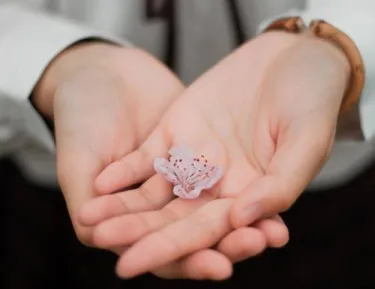Let Me Sow Love
A Letter from Thomas Goetz, serving in Japan
Dear friends,
“He has told you, O mortal, what is good, and what does the Lord require of you but to do justice and to love kindness and to walk humbly with your God?” Micah 6:8 - New Revised Standard Version
How does a Japanese Christian look? I know this is one of those “Garden Path” questions. It can mean how a Japanese Christian appears and what type of clothes they wear. Or it can refer to how this person sees the world and when they take action. To settle the mundane side of things, having lived in Japan for more than half my life, they look pretty much like everyone else. It would be impossible to view one of those internet cams, zoom in on a crowd, and say with certainty that THIS person IS a CHRISTIAN. That is not going to happen.

How a Japanese Christian looks at the world now is something favorably different. Let’s listen to a Japanese Christian talk about a particular day at work.
“It was a day like any other. I was teaching at my middle school, conducting English classes. On that day, I had planned a game. It was the Hamburger Shop. So, I brought everything the children needed. They would get into groups to practice the different roles, and then each group would demonstrate how the Hamburger Shop works. I had the plastic cash register, the menu board, the plastic food, soda cups filled with foam, and the play money. I had forgotten the play money in the teachers’ room. What a time to figure that one out! I was on the second floor and had to go to the ground floor. The students were all behaving, so I told them about my goof. They were good with that, and off I went.
In the stairwell, I saw a girl, a third-year girl whom I had taught last year. I called her by name. She buried her face in her hands as she was crying. As it turns out, she was on her way to the lavatory when she could not hold it anymore. Fearing that if she took another step, everything inside would come out, she was stuck, in the stairwell, unable to move but unable to do anything else. Without much imagination, a picture came into focus. She was not in class. Her excused absence was probably noticed. And with a larger accident about to happen, returning with soiled undergarments and the telltale stench was too much. Japan may seem to outsiders to be an orderly and polite society. To a large extent, that is true. However, children can be cruel in any culture, with Japan being no exception. We went to the nurse’s room with a larger mess. Yes, these things happen. And there, together with the school nurse, we cared for her. The nurse and I being middle-aged women, came up with a change of undergarments. We sent word to her teacher to cover for her absence. Once she was clean and settled down, she returned to class with a note.
What happened? Or rather, what DIDN’T happen? That is the question. She was in trouble and alone, fearing that her classmates would notice and tease her if she had to return with soiled pants. That would follow her for the rest of her life.
How easy it would have been to walk past her. After all, I was on my way to fix my problem. I would hope that a non-Christian would have done the same thing, but as for me, I felt that God wanted me to look to the side, set things down, and be something more than a teacher, to be her friend.
That night, the phone rang. It was her mother thanking me. Of course, I said it was no trouble. That anyone would do the same thing. But no. Her mother disagreed. She said that because I helped her daughter, she could return to school, show her face, and be like everyone else. It was all about shame. Shame was the immanent crushing reality fueling the girl’s tears. The shame of having a bowel accident was too much for her—the shame of returning to class dirty. Japan is a shame-based culture, not a guilt-based culture as North America and Europe are. Shame is loaded upon people whether they deserve it or not. She did not deserve it. As a Japanese, I know this in an instant. And, as a Christian, these moments were for me to shoulder the cross.
In a shame-based society, when dreams come true that is great. But when we see nightmares before us, we live in fear with nowhere to go. But at least we crushed this nightmare. I can only thank God for leading me on that day.”
So, how does a Japanese Christian look? This one looks like the Christian in St. Francis of Assisi’s prayer.
“Lord, make me an instrument of your peace; where there is hatred, let me sow love; where there is injury, pardon; where there is discord, union; where there is doubt, faith; where there is despair, hope; where there is darkness, light; and where there is sadness, joy.
“O Divine Master, grant that I may not so much seek to be consoled, as to console; to be understood, as to understand; to be loved, as to love; for it is in giving that we receive, it is in pardoning that we are pardoned, and it is in dying that we are born to eternal life.” Amen.
On that day at school, despair became hope. Sadness did not stay in her home; joy came to live there instead.
This is how this one Japanese Christian looks, everyone!
How do Christians look where you live?
Thomas
Ubi caritas, et amor, Deus ibi est. Where there is caring and love, God is always there.
Please read the following letter from Rev. Mienda Uriarte, acting director of World Mission:
Dear Partners in God’s Mission,
What an amazing journey we’re on together! Our call to be a Matthew 25 denomination has challenged us in so many ways to lean into new ways of reaching out. As we take on the responsibilities of dismantling systemic racism, eradicating the root causes of poverty and engaging in congregational vitality, we find that the Spirit of God is indeed moving throughout World Mission. Of course, the past two years have also been hard for so many as we’ve ventured through another year of the pandemic, been confronted with racism, wars and the heart wrenching toll of natural disasters. And yet, rather than succumb to the darkness, we are called to shine the light of Christ by doing justice, loving kindness and walking humbly with God.
We are so grateful that you are on this journey as well. Your commitment enables mission co-workers around the world to accompany partners and share in so many expressions of the transformative work being done in Christ’s name. Thank you for your partnership, prayers and contributions to their ministries.
We hope you will continue to support World Mission in all the ways you are able:
Give – Consider making a year-end financial contribution for the sending and support of our mission personnel (E132192). This unified fund supports the work of all our mission co-workers as they accompany global partners in their life-giving work. Gifts can also be made “in honor of” a specific mission co-worker – just include their name on the memo line.
Pray – Include PC(USA) mission personnel and global partners in your daily prayers. If you would like to order prayer cards as a visual reminder of those for whom you are praying, please contact Cindy Rubin (cynthia.rubin@pcusa.org; 800-728-7228, ext. 5065).
Act – Invite a mission co-worker to visit your congregation either virtually or in person. Contact mission.live@pcusa.org to make a request or email the mission co-worker directly. Email addresses are listed on Mission Connections profile pages. Visit pcusa.org/missionconnections to search by last name.
Thank you for your consideration! We appreciate your faithfulness to God’s mission through the Presbyterian Church (U.S.A.).
Prayerfully,

Rev. Mienda Uriarte, Acting Director
World Mission
Presbyterian Mission Agency
Presbyterian Church (U.S.A.)
To give, please visit https://bit.ly/22MC-YE.
For it is the God who said, ‘Let light shine out of darkness,’ who has shone in our hearts to give the light of the knowledge of the glory of God in the face of Jesus Christ. 2 Corinthians 4:6
